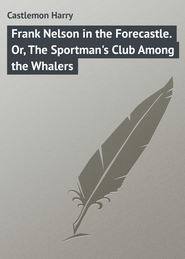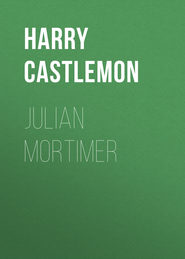По всем вопросам обращайтесь на: info@litportal.ru
(©) 2003-2025.
✖
A Rebellion in Dixie
Настройки чтения
Размер шрифта
Высота строк
Поля
“Good morning,” said Swayne, and his voice trembled and his hand shook as he hauled up some chairs for them to seat themselves. “I did not expect to see so many of you here this fine morning.”
“We have no time to sit down,” said Mr. Sprague, who was supposed to do all the talking. “You are a rebel, are you not?”
“Well – yes; that is it depends on what you call a rebel,” said Mr. Swayne, trying to laugh at his own wit. “I am opposed to your trying to take this county out of the State; because why – ”
“So I supposed. We have come here to tell you that you can pack up and leave this county as soon as you please. We don’t want to hear any argument about it.”
“Why – why, where shall I go to?” exclaimed Swayne, while the boy turned whiter than ever. “If I leave here, I leave everything I have got behind me.”
“We will give you an hour to pack up things. If you are in the house at the end of that time, we shall set fire to it.”
“Well, now, see here,” said Swayne, who grew more frightened than ever; “I can’t pack up in an hour – ”
“I have told you just what I intend to do,” said Mr. Sprague, consulting his watch. “It is now ten o’clock. If you are in here at eleven we shall set the house going. If you are out of it in that time, why, we’ll save it. You want to make up your mind in a hurry.”
“Of all the brazen-faced fellows I ever saw you are the beat,” said Swayne, his fear giving place to anger. “I wish I had half a dozen Confederate soldiers here to protect me.”
“By gum! We’ll set the house a-going before you get out of it,” said one of Mr. Sprague’s men. “You ain’t a-going to talk to us like that.”
“One moment, Bud. We’ll sit down here on the porch until he gets through being mad, and then maybe he’ll pack up. You had better go, Swayne, for as sure as we are sitting on this porch, so sure will we set fire to it.”
In the meantime Leon and Tom had stood close together, and as Carl flounced into the house after his uncle, the two bounded up the steps and went up to the frightened boy.
“A word in your ear,” said Leon.
“Well, I don’t want anything to do with you,” said Carl, almost ready to cry when he found himself driven away from his home. “A man who will do as you have done has no business with a white person.”
“One moment,” said Leon, while Tom cocked his gun and brought it to bear on Carl’s head. “That brings you to your senses, don’t it? Here’s a resolution of secession that my father got up yesterday, and which was left on a tree down here, and I found it torn up and strewn on the ground. Did you have a hand in it?”
“Say, Tom, I want you to turn that gun the other way,” said Carl, who dared not move for fear that the rifle would still be pointed at him.
“Did you have a hand in it?” repeated Leon.
“Yes, I did,” said Carl, who, remembering that his uncle had got off easy by showing some grit, now resolved to show a little himself. “I will tear up every one you put there.”
“Well, I want you to go into the house and bring out some writing materials, and sit down at this table here on the porch and draw up a full copy of this resolution,” said Leon; and Carl had never heard him speak so before. As he spoke he drew a revolver from his pocket.
“I can’t write as well as that,” stammered Carl, who saw that he had got to do something very soon. “I wish you would put that revolver away. You don’t know how it worries me to have those things in sight.”
“You can write well enough. Go and get the pen and ink. And mind you, you want to be out here in short order, or we will be in there after you.”
Carl hurried into the house, while Tom uncocked his gun and leaned upon it, and Leon put his revolver into his pocket. They didn’t think they would have any more use for them. Carl went at once to the room in which his aunt was busy packing up some of her clothes, and the face he brought with him was enough to attract anybody’s attention.
“Well, Carl, this is pretty rough, ain’t it?” said his uncle, who was engaged in getting some of his own things together.
“I should say it was,” whimpered Carl. “Are you not going to be revenged on these fellows?”
“We’ll be revenged on them so quick that they won’t know it,” said his aunt, in a husky voice. She didn’t cry, but her hands trembled and her face was very white.
“Where are your writing materials, aunt? That little Leon Sprague is going to make me write out those resolutions I tore down. I wish, with uncle, that we had some half a dozen Confederate soldiers here. Wouldn’t we make a scattering among them?”
“Carl, you can’t have those writing materials,” said his aunt, who was struck motionless with surprise. “Tell him that we haven’t got any in the house. The young jackanapes! Where’s your rifle, that you don’t use it? I wish I were a man for about twenty minutes. There wouldn’t be so many of them as there are now.”
“But, aunt, they have got fire-arms, and they pulled them on me,” said Carl. “If I don’t get them out there very soon they will come after me.”
“You will find them in the top bureau drawer,” said his aunt, who began to think it was necessary to show a little speed. “Wait until I get my things all together and get out there, I will give them a piece of my mind.”
“Now, Lydia, you want to be mighty careful what you say out there,” said her husband. “They have got weapons, and they had just as soon use them as not. It is a pretty piece of business, this allowing strangers to drive us away from our home, but I tell you we’ll have revenge for it sooner or later. Pack up all your things in a hurry, for we have an hour left us in which to save our home.”
Carl, seeing that his uncle had no way to propose for him to get out of making a copy of that secession resolution, hunted up the writing materials as soon as he could, and went out on the porch with them. He found Leon and Tom there, and they were getting impatient.
“Look here,” said the former, “if you want to help your uncle get his things together you will move a little spryer than that. Now, sit down at this table and make out a full copy of this paper, just as it was when you pulled it down.”
“I’ll bet you won’t always have things all your own way,” said Carl, as he seated himself and removed the stopper from the ink-bottle. “You don’t suppose we’ll come back, do you?”
“I suppose you will, and that you will have men with you,” said Leon. “But you must bring all of two thousand men to put this rebellion down. Don’t let’s have any more talk. Go on and write out that paper.”
“And remember, it’s got to be the same as it was there,” said Tom, when he saw Carl arrange the pieces without reference to what came after them. “If you don’t, you will have to write it over again.”
While Carl was busy with his copying his uncle and aunt came out on the porch. They didn’t say a word, but brought with them a large bundle of clothing that they wanted to save. Aunt Lydia showed that she would have annihilated Mr. Sprague if she could, for the glance she cast upon him was full of hate. Mr. Swayne then took a horn down from a nail under the porch and blew two long blasts upon it. That was a signal to let the field-hands know that they were wanted. Presently the field-hands came up, a half a dozen of them, and although they may have been very smart negroes, the clothing which they wore did not proclaim the fact. There was hardly a piece of cloth on them that wasn’t patched until it was almost ready to drop off their persons. They looked on in surprise when they saw so many Union men there (they used to say that the darkies were rather blunt in such matters, and that they didn’t know who the Union men were), and saw the piles of clothing that had been brought out, but the first words their master spoke to them cleared everything up.
“We’ve got to go away from home now, or these men are going to burn it,” said Mr. Swayne. “Hitch those mules to the lumber-wagons and bring them up here. Be in a hurry, now, for we have no time to waste.”
The darkies rolled their eyes in great astonishment, and then went about their work with alacrity. In a few minutes the wagons were driven up to the door, and the darkies began to pile in the clothes. While Mr. Sprague was watching them he became aware that somebody was trying to attract his attention. A pebble thrown by a friendly hand hit him on the shoulder. He faced about, and saw one of the darkies behind the house. When he saw Mr. Sprague looking at him he beckoned to him to come where he was.
CHAPTER IV
CARL BRINGS NEWS
“Say, Marse Sprague, is you Union men going to burn dese houses ober deir heads?” began the darky, so excited that he could scarcely stand still.
“We have given them an hour to take their things out,” said Mr. Sprague. “If they don’t take them out in that time we’ll set the house a-going. If they get all their things out and loaded in the wagons we’ll save the house, so that they can have something to live in when these troubles are all over.”
“Whar do you reckon dey’ll go if dey get the things all tooken out?” asked the negro.
“I don’t know where they will go; over into the next county, probably. But what makes you so anxious?”
“Well, say, Marse Sprague, I don’t care to go ober into the next county wid ’em. Dey’s rebels ober dere.”
“So I have heard.”
“Well, I don’t want to go among dose rebels ’cause I won’t get no freedom. Dey say we’ll get it in a little while if we stays here among dese Union men.”
“Who told you that?”
“Your own Mose told me dat, sah.”
“Is Mose going to take his freedom when he can get it?”











